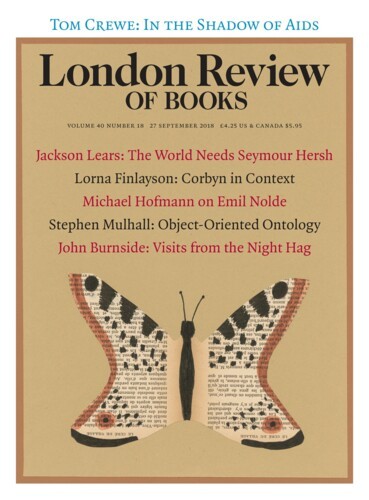On Monday, seven MPs resigned from the Labour Party – though not from their seats in the Commons – to form a new ‘Independent Group’ in Parliament. An eighth joined them yesterday, and three Tories today. Few people, arguably including the splitters themselves, have much confidence that the breakaway group can garner significant public support, or achieve any particular objective.
Lorna Finlayson
Lorna Finlayson teaches philosophy at Essex. An Introduction to Feminism came out in 2016.
Earlier this year I wrote about the planned changes to mental health provision for students at the University of Essex. The details were murky but the outline was clear enough: yet more cuts and outsourcing. Though seemingly unwilling to give staff and students a clear explanation of what was going to happen, the university was at pains to emphasise one point: that this was to be an ‘expansion’ of counselling provision for students – a 30 per cent expansion, no less.
Amid the poppies, the parades, the TV programmes on military themes, the commemorative art works springing up in towns and villages across the country, Theresa May said last week that she would be laying a wreath at the graves of British soldiers in France on the centenary of the Armistice to commemorate ‘every member of the Armed Forces who gave their lives to protect what we hold so dear’.
By the end of the Labour Party Conference last week, it was clear that something had changed. For once, the media coverage was broadly positive. The same outlets that had played host to endless attempts to derail the party's leftward movement, and to undermine its elected leader, now granted a belated (and qualified) endorsement – if not of Jeremy Corbyn's project, exactly, then at least of its legitimacy and viability as a political force.
Corbyn Now
Lorna Finlayson, 27 September 2018
In the event that Corbyn survives to win an election and form a government, what may be hoped from it? It has often been said that we should not expect his troubles to end when he becomes prime minister, and indeed that this may be the moment when his real problems begin. This is probably true, if not very useful. What we may hope for also depends on a more basic and fundamental question. If you think that capitalism can be managed in such a way as to afford a decent life for all, then it is precisely this we should hope for and demand from a Labour victory under Corbyn. If not, the hope must be for something else.
Podcasts & Videos
The Corbyn Project
Lorna Finlayson and Tom Crewe
Tom Crewe talks to Lorna Finlayson about Jeremy Corbyn and Labour’s prospects in the general election and beyond.
Read anywhere with the London Review of Books app, available now from the App Store for Apple devices, Google Play for Android devices and Amazon for your Kindle Fire.
Sign up to our newsletter
For highlights from the latest issue, our archive and the blog, as well as news, events and exclusive promotions.


